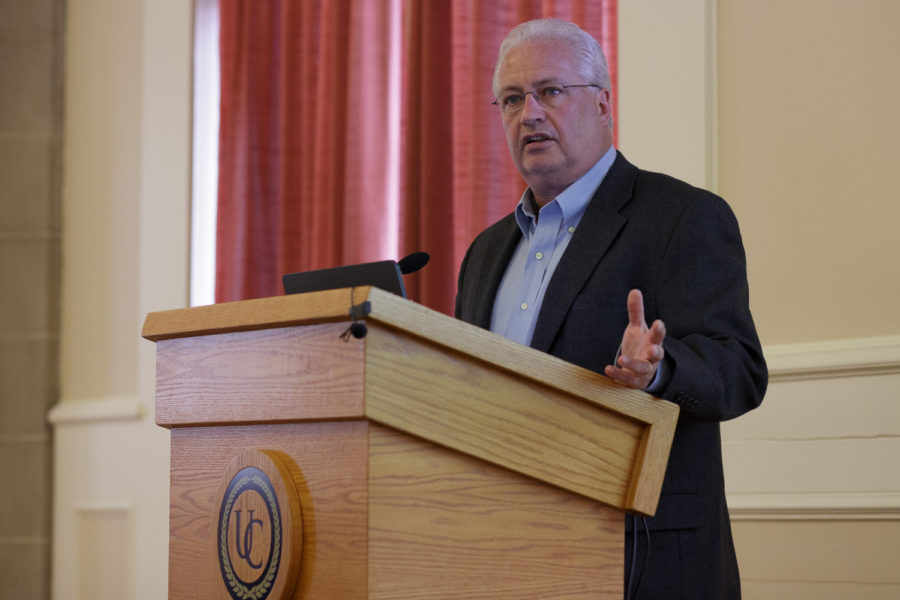Pitt graduate student union organizers have garnered more than 870 signatures to rename Parran Hall — the Pitt Public Health building named after the school’s founding dean who was involved in unethical medical experiments.
But Thursday at a University-organized symposium discussing the legacy of the building’s namesake — Thomas Parran Jr. — most speakers did not go as far as the students’ demand.
“Young people need to understand that they can make the same mistakes as Thomas Parran in a different way and a different situation,” Professor Bill Jenkins of Morehouse College said.
The University is examining the possibility of renaming Parran Hall as a result of the doctor’s involvement in two controversial studies while surgeon general of the United States from 1936-1948 — the Tuskegee and Guatemalan syphilis experiments. Donald S. Burke, the current dean of the public health school, initiated an official review of the name in January, which reignited the debate, along with the graduate organizers petition.
The symposium in the University Club featured four different speakers who have studied and written about Parran and the history of the infamous experiments.
Gregory J. Dober, a health care ethics advocate at Pitt’s Center for Bioethics and Health Law, first spoke about Parran’s positive impact, citing his accomplishments in increasing research and funding for post-traumatic stress disorder and communicable diseases. But Parran’s record turned out not to be as progressive as was commonly believed.
Dober was the first to discover the breadth of Parran’s involvement in the Tuskegee experiments, when he came across papers written by Parran that were archived at Pitt while doing research for his 2013 book, “Against Their Will: The Secret History of Medical Experimentation on Children in Cold War America.”
In the Tuskegee syphilis experiment, American researchers observed the course of untreated syphilis in hundreds of African-American men between 1932 and 1972. The researchers exploited their participants, and the experiment has became a landmark case study in medical ethics.
“[Parran wrote,] ‘Hypothetically, if you wanted to do this study, you should do it in this county and this is how you should do it,’” Dober said.
Jenkins helped put a stop to the Tuskegee study in the ’70s while a professor at the University of North Carolina. He took care of the men subjected to the experiments and listened to their stories.
“There’s people that write about the study, that talk about the study, but they don’t listen to the men in the study,” he said. “[The men] participated in the study because they thought they were helping their community. They were heroes, and that’s why I stayed until the last man died.”
Jenkins, now a professor of public health sciences at Morehouse and associate director of its research center on health disparities, said the only way to combat racism in society is to observe how people are perpetuating systematic racism.
He advocated for keeping the plaque and name of the building because removing it would erase the good work Parran did and prevent lessons surrounding the negatives. He said it would limit conversations about the racism present in public health.
Susan Reverby, a Wellesley College professor who uncovered the Guatemalan syphilis experiments, also spoke at the event. Parran was also involved in the study in which researchers intentionally exposed more than 1,300 Guatemalan prisoners and mental institution patients to transferable diseases between.
Reverby said Parran’s approval of the experiment is undeniable, but the underlying question in renaming the building is whether or not Parran should be “historically fired.”
“It’s obvious they thought they were doing the best they could do for medical science in the war against syphilis,” she said.
But Reverby, who referred to the experiments as a “medical melodrama with voiceless actors and madmen doctors,” said the problems of systematic racism and imperialism in public health will not simply go away if Parran’s name is erased from history.
“If we disappear his name, what then is learned?” she said. “Regardless if the name is changed, the historical context ought to be described in a new plaque and linked to a new page, [and] it should explain what Parran is known for — good and bad.”
Kirk Savage, an associate professor in the department of history of art and architecture, said that regardless of a name change, a dialogue needed to start about Parran’s history.
“Taking the sign down is easy,” Savage said, but reckoning with history in a way that promotes meaningful discussion and elicits change is often hard — but needs to be pursued.
As the event progressed, the grad union organizers voiced their disagreement with some of the speakers on Twitter.
“The complicated discourse around his legacy and contributions to the field is irrelevant to the fact that we (as evidenced by many signed petitions) don’t believe we should monumentalize him,” one tweet read.
After the symposium, Rebecca Schoulberg, a 1989 alum and mother of an incoming student, said that while she is not a bioethicist, she views the field of public health as empathetic, and keeping Parran Hall’s name goes against that.
“Public Health is rooted in ethics [and] moral behavior,” she said. “And if you don’t treat people empathetically, they aren’t going to trust you.”
Leigh Bukowski, a graduate of the School of Public Health and current senior research manager in the department of behavioral and community health sciences, said she supports the renaming of Parran Hall.
“I think for my friends and colleagues of color, it’s an important first step in making sure they feel safe in a space that they have to interact in every day,” Bukowski said.



